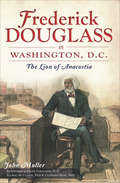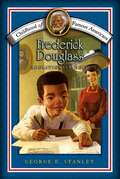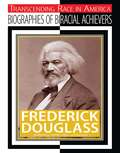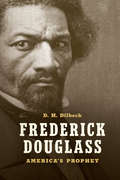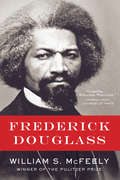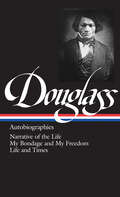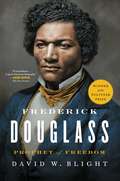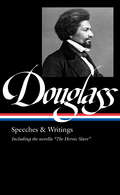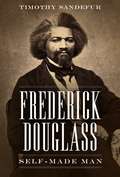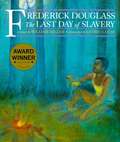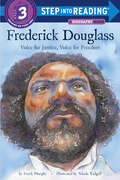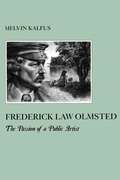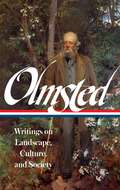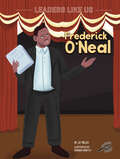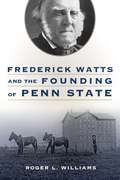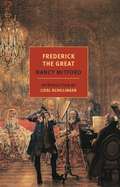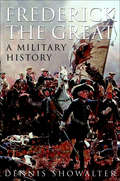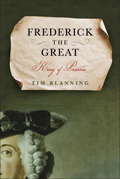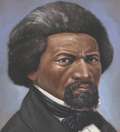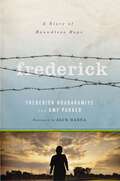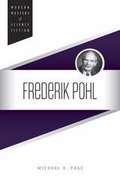- Table View
- List View
Frederick Douglass in Washington, D.C.: The Lion of Anacostia (American Heritage Ser.)
by John Muller&“Reconstruct[s] Douglass&’s life in the nation&’s capital, both at home and in the halls of power, in ways that no other biographer has done&” (Leigh Fought, author of Women in the World of Frederick Douglass). The remarkable journey of Frederick Douglass from fugitive slave to famed orator and author is well recorded. Yet little has been written about Douglass&’s final years in Washington, DC. Journalist John Muller explores how Douglass spent the last eighteen years of his life professionally and personally in his home, Cedar Hill, in Anacostia. The ever-active Douglass was involved in local politics, from aiding in the early formation of Howard University to editing a groundbreaking newspaper to serving as marshal of the District. During this time, his wife of forty-four years, Anna Murray, passed away, and eighteen months later, he married Helen Pitts, a white woman. Unapologetic for his controversial marriage, Douglass continued his unabashed advocacy for the rights of African Americans and women and his belief in American exceptionalism. Through meticulous research, Muller has created a fresh and intimate portrait of Frederick Douglass of Anacostia. Includes photos! &“Muller&’s book connects Douglass to the city and neighborhood the way no other project has yet been able to . . . you&’re able to re-imagine the man and re-consider the possibilities of the place he once lived.&” —Martin Austermuhle, DCist
Frederick Douglass: Abolitionist Editor
by Sharman Apt Russell Heather Lehr WagnerA biography of the man who, after escaping slavery, became an orator, writer, and leader in the anti-slavery movement of the early nineteenth century.
Frederick Douglass: Abolitionist Hero
by George E. StanleyFrederick Douglass was born into slavery. He was separated from his family when he was young, worked day and night, and was beaten for no other reason than the color of his skin. How could anyone ever overcome such overwhelming odds? But Frederick eventually became a famous abolitionist, author, statesman, and reformer. Read all about how one of the most prominent figures in African American history triumphed over impossible obstacles, and paved the way for others to achieve their own freedom!
Frederick Douglass: Abolitionist, Author, Editor, and Diplomat
by Jim WhitingFrederick Douglass never knew the identity of his father, though he was probably a white slave owner. His mother was a slave. Frederick was taken from her soon after his birth. He only saw her a few times before she died. It seemed likely that Frederick would live out his life as a slave. But from an early age, he was determined to become a free man. He escaped to the North when he was about 20. A few years later, he discovered that he was an outstanding public speaker. For the rest of his life, Frederick would courageously speak out about the issues that affected his fellow blacks. Sometimes his actions placed him in great danger. During his lifetime no other African American did as much for blacks as Frederick Douglass. Even today his memory continues to inspire many people to work for civil rights and racial justice.
Frederick Douglass: America's Prophet
by D. H. DilbeckFrom his enslavement to freedom, Frederick Douglass was one of America's most extraordinary champions of liberty and equality. Throughout his long life, Douglass was also a man of profound religious conviction. In this concise and original biography, D. H. Dilbeck offers a provocative interpretation of Douglass's life through the lens of his faith. In an era when the role of religion in public life is as contentious as ever, Dilbeck provides essential new perspective on Douglass's place in American history. Douglass came to faith as a teenager among African American Methodists in Baltimore. For the rest of his life, he adhered to a distinctly prophetic Christianity. Imitating the ancient Hebrew prophets and Jesus Christ, Douglass boldly condemned evil and oppression, especially when committed by the powerful. Dilbeck shows how Douglass's prophetic Christianity provided purpose and unity to his wide-ranging work as an author, editor, orator, and reformer. As "America's Prophet," Douglass exposed his nation's moral failures and hypocrisies in the hopes of creating a more just society. He admonished his fellow Americans to truly abide by the political and religious ideals they professed to hold most dear. Two hundred years after his birth, Douglass's prophetic voice remains as timely as ever.
Frederick Douglass: Frederick Douglass And Transatlantic Reform (Norton Critical Editions Ser. #0)
by William S. McFeely“A detailed, finely written portrait of the imposing 19th-century leader.” —David Levering Lewis, New York Times Book Review Born into but escaped from slavery, Frederick Douglass—orator, journalist, autobiographer; revolutionary on behalf of a just America—was a towering figure, at once consummately charismatic and flawed. His Narrative of the Life of Frederick Douglass (1845) galvanized the antislavery movement and is one of the truly seminal works of African-American literature. In this Lincoln Prize– winning biography, William S. McFeely captures the many sides of Douglass— his boyhood on the Chesapeake; his self-education; his rebellion and rising expectations; his marriage, affairs, and intense friendships; his bitter defeat and transcendent courage—and re-creates the high drama of a turbulent era.
Frederick Douglass: Freedom Fighter
by Lillie PattersonDouglass fought for the rights of all people and of animals. He was an accomplished orator.
Frederick Douglass: Narrative of the Life / My Bondage and My Freedom / Life and Times (Classic Bks.)
by Frederick DouglassHenry Louis Gates, Jr. presents the only authoritative edition of all three autobiographies by the escaped slave who became a great American leader.Here in this Library of America volume are collected Frederick Douglass's three autobiographical narratives, now recognized as classics of both American history and American literature. Writing with the eloquence and fierce intelligence that made him a brilliantly effective spokesman for the abolition of slavery and equal rights, Douglass shapes an inspiring vision of self-realization in the face of monumental odds.Narrative of the Life of Frederick Douglass, an American Slave (1845), published seven years after his escape, was written in part as a response to skeptics who refused to believe that so articulate an orator could ever have been a slave. A powerfully compressed account of the cruelty and oppression of the Maryland plantation culture into which Douglass was born, it brought him to the forefront of the anti-slavery movement and drew thousands, black and white, to the cause.In My Bondage and My Freedom (1855), Douglass expands the account of his slave years. With astonishing psychological penetration, he probes the painful ambiguities and subtly corrosive effects of black-white relations under slavery, and recounts his determined resistance to segregation in the North. The book also incorporates extracts from Douglass&’s speeches, including the searing &“What to the Slave Is the Fourth of July?&”Life and Times, first published in 1881, records Douglass&’s efforts to keep alive the struggle for racial equality udirng Reconstruction. John Brown, Abraham Lincoln, William Lloyd Garrison, and Harriet Beecher Stowe all feature prominently in this chronicle of a crucial epoch in American history. The revised edition of 1893, presented here, includes an account of his controversial diplomatic mission to Haiti.This volume contains a detailed chronology of Douglass&’s life, notes providing further background on the events and people mentioned, and an account of the textual history of each of the autobiographies.LIBRARY OF AMERICA is an independent nonprofit cultural organization founded in 1979 to preserve our nation&’s literary heritage by publishing, and keeping permanently in print, America&’s best and most significant writing. The Library of America series includes more than 300 volumes to date, authoritative editions that average 1,000 pages in length, feature cloth covers, sewn bindings, and ribbon markers, and are printed on premium acid-free paper that will last for centuries.
Frederick Douglass: Portrait of a Freedom Fighter
by Sheila KeenanThis book recounts Douglass's life as a slave, his daring escape to freedom, and his rise to the foremost African-American abolitionist of his time.
Frederick Douglass: Prophet of Freedom
by David W. Blight**Winner of the Pulitzer Prize in History** &“Extraordinary…a great American biography&” (The New Yorker) of the most important African-American of the nineteenth century: Frederick Douglass, the escaped slave who became the greatest orator of his day and one of the leading abolitionists and writers of the era.As a young man Frederick Douglass (1818–1895) escaped from slavery in Baltimore, Maryland. He was fortunate to have been taught to read by his slave owner mistress, and he would go on to become one of the major literary figures of his time. His very existence gave the lie to slave owners: with dignity and great intelligence he bore witness to the brutality of slavery. Initially mentored by William Lloyd Garrison, Douglass spoke widely, using his own story to condemn slavery. By the Civil War, Douglass had become the most famed and widely travelled orator in the nation. In his unique and eloquent voice, written and spoken, Douglass was a fierce critic of the United States as well as a radical patriot. After the war he sometimes argued politically with younger African Americans, but he never forsook either the Republican party or the cause of black civil and political rights. In this &“cinematic and deeply engaging&” (The New York Times Book Review) biography, David Blight has drawn on new information held in a private collection that few other historian have consulted, as well as recently discovered issues of Douglass&’s newspapers. &“Absorbing and even moving…a brilliant book that speaks to our own time as well as Douglass&’s&” (The Wall Street Journal), Blight&’s biography tells the fascinating story of Douglass&’s two marriages and his complex extended family. &“David Blight has written the definitive biography of Frederick Douglass…a powerful portrait of one of the most important American voices of the nineteenth century&” (The Boston Globe). In addition to the Pulitzer Prize, Frederick Douglass won the Bancroft, Parkman, Los Angeles Times (biography), Lincoln, Plutarch, and Christopher awards and was named one of the Best Books of 2018 by The New York Times Book Review, The Wall Street Journal, The Boston Globe, The Chicago Tribune, The San Francisco Chronicle, and Time.
Frederick Douglass: Selected Speeches And Writings (The\library Of Black America Ser.)
by Frederick DouglassLibrary of America presents the biggest, most comprehensive trade edition of Frederick Douglass's writings ever publishedEdited by Pulitzer Prize–winning biographer David W. Blight, this Library of America edition is the largest single-volume selection of Frederick Douglass&’s writings ever published, presenting the full texts of thirty-four speeches and sixty-seven pieces of journalism. (A companion Library of America volume, Frederick Douglass: Autobiographies, gathers his three memoirs.) With startling immediacy, these writings chart the evolution of Douglass&’s thinking about slavery and the U.S. Constitution; his eventual break with William Lloyd Garrison and many other abolitionists on the crucial issue of disunion; the course of his complicated relationship with Abraham Lincoln; and his deep engagement with the cause of women&’s suffrage. Here are such powerful works as &“What to the Slave Is the Fourth of July?,&” Douglass&’s incandescent jeremiad skewering the hypocrisy of the slaveholding republic; &“The Claims of the Negro Ethnologically Considered,&” a full-throated refutation of nineteenthcentury racial pseudoscience; &“Is it Right and Wise to Kill a Kidnapper?,&” an urgent call for forceful opposition to the Fugitive Slave Act; &“How to End the War,&” in which Douglass advocates, just days after the fall of Fort Sumter, for the raising of Black troops and the military destruction of slavery; &“There Was a Right Side in the Late War,&” Douglass&’s no-holds-barred attack on the &“Lost Cause&” mythology of the Confederacy; and &“Lessons of the Hour,&” an impassioned denunciation of lynching and disenfranchisement in the emerging Jim Crow South. As a special feature the volume also presents Douglass&’s only foray into fiction, the 1853 novella &“The Heroic Slave,&” about Madison Washington, leader of the real-life insurrection on board the domestic slave-trading ship Creole in 1841 that resulted in the liberation of more than a hundred enslaved people. Editorial features include detailed notes identifying Douglass&’s many scriptural and cultural references, a newly revised chronology of his life and career, and an index.
Frederick Douglass: Self-Made Man
by Timothy SandefurFrederick Douglass rose to become one of the nation's foremost intellectuals―a statesman, author, lecturer, and scholar who helped lead the fight against slavery and racial oppression. Unlike other leading abolitionists, however, Douglass embraced the U.S. Constitution, insisting that it was an essentially anti-slavery document and that its guarantees for individual rights belonged to all Americans, of whatever race.
Frederick Douglass: The Last Day Of Slavery
by William Miller Cedric LucasBorn into slavery young Frederick dreams of the day he and his people will be free. Yet until that day comes, his only escape is through the books he reads, which take him to worlds far from his own.<P> When a menacing overseer named Covey sees that Frederick is different from the others, he sets out to "break" the young reader. But Frederick's surprising response to Covey's brutality is an act of courage that frees forever what no person can hold captive: his spirit
Frederick Douglass: Voice for Justice, Voice for Freedom (Step into Reading)
by Frank MurphyLearn about the abolitionist Frederick Douglass and his fight for freedom in this Step 3 Biography Reader!Frederick Douglass was a keystone figure in the abolitionist movement, and his story has impacted generations of people fighting for civil rights in America. He was born to an enslaved mother and grew up with the horrors of slavery. In the course of his childhood, he was able to learn to read, and soon realized that reading and language were a source of power, and could be the keys to his freedom. Frederick Douglass spoke and wrote about injustice and equality, and his words profoundly affected the conversation about slavery in America. His activism will resonate with kids today who are observing and participating in our activist culture. Step 3 Readers feature engaging characters in easy-to-follow plots about popular topics--for children who are ready to read on their own.
Frederick Law Olmstead: The Passion of a Public Artist (The American Social Experience #13)
by Melvin KalfusFrederick Law Olmsted is famous for his urban landscape designs: Central Park in Manhattan, Prospect Park in Brooklyn, and Franklin Park in Boston. Olmsted devoted much of his later life to this work. What was the source of this creative energy and imagination in his fascinating years? Melvin Kalfus is the first author to examine Olmsted's troubled, sometimes tragic childhood and adolescence in a search for the inner sources of his creative imagination. Kalfus argues that Olmsted's distressing early experiences fired his ambition and led him so obsessively to seek the world's esteem through his works. Kalfus also looks at Olmsted's varied early career during which he worked as an apprentice merchant, a seaman, a farmer, a manager of a mining plantation in California, a journalist, and author of three istorically important books on slavery, and as the General Secretary of the Civil War's Sanitary Commission, and enormous project organized to provide medical aid to Union soldiers.
Frederick Law Olmsted: Writings on Landscape, Culture, and Society
by Frederick Law Olmsted Charles BeveridgeThe biggest and best single-volume collection ever published of the fascinating and wide-ranging writings of a vitally important nineteenth century cultural figure whose work continues to shape our world today. Seaman, farmer, abolitionist, journalist, administrator, reformer, conservationist, and without question America's foremost landscape architect and urban planner, Frederick Law Olmsted (1822-1903) was a man of unusually diverse talents and interests, and the arc of his life and writings traces the most significant developments of nineteenth century American history. As this volume reveals, the wide-ranging endeavors Olmsted was involved in--cofounding The Nation magazine, advocating against slavery, serving as executive secretary to the United States Sanitary Commission (precursor to the Red Cross) during the Civil War, championing the preservation of America's great wild places at Yosemite and Yellowstone--emerged from his steadfast commitment to what he called "communitiveness," the impulse to serve the needs of one's fellow citizens. This philosophy had its ultimate expression is his brilliant designs for some of the country's most beloved public spaces: New York's Central Park, Prospect Park in Brooklyn, Boston's "Emerald Necklace," the Biltmore Estate in North Carolina, the grounds of the U.S. Capitol, garden suburbs like Chicago's Riverside, parkways (a term he invented) and college campuses, the "White City" of the 1893 World's Columbian Exposition, and many others. Gathering almost 100 original letters, newspaper dispatches, travel sketches, essays, editorials, design proposals, official reports, reflections on aesthetics, and autobiographical reminiscences, this deluxe Library of America volume is profusely illustrated with a 32-page color portfolio of Olmsted's design sketches, architectural plans, and contemporary photographs. It also includes detailed explanatory notes and a chronology of Olmsted's life and design projects.From the Hardcover edition.
Frederick O'Neal (Leaders Like Us #12)
by J. P. MillerChildren learn about one of the most influential African American leaders in history with the biography of Frederick O’Neal.Not only was Frederick O’Neal a leader and pioneer, but he was also a talented actor and entertainer! Follow along to learn more about Frederick’s life and the contributions he made to the stage.Storybook Features:This children’s book features a glossary with new vocabulary, text-dependent questions, and an extension activity to develop reading comprehension skills.24 pages of vibrant illustrationsLexile 290LAbout RourkeWe proudly publish respectful and relevant non-fiction and fiction titles that represent our diverse readers, and are designed to support reading on a level that has no limits!
Frederick Watts and the Founding of Penn State
by Roger L. WilliamsFrederick Watts came to prominence during the nineteenth century as a lawyer and a railroad company president, but his true interests lay in agricultural improvement and in raising the economic, social, and political standing of Pennsylvania’s farmers. After being elected founding president of The Pennsylvania State Agricultural Society in 1851, he used his position to advocate vigorously for the establishment of an agricultural college that would employ science to improve farming practices. He went on to secure the charter for the Farmers’ High School of Pennsylvania, which would eventually become the Pennsylvania State University.This biography explores Watts’s role in founding and leading Penn State through its formative years. Watts adroitly directed the school as it was sited, built, and financed, opening for students in 1859. He hired the brilliant Evan Pugh as founding president, who, with Watts, quickly made it the first successful agricultural college in America. But for all his success in launching the institution, Watts nearly brought it to the brink of closure through a series of ruinous presidential appointments that led to an abandonment of the land-grant focus on agriculture and engineering.Watts’s influence in the agricultural modernization movement and his impact on land-grant education in the United States—both in his role with Penn State and later as US commissioner of agriculture—made him a leader in the history of agricultural and higher education. Roger L. Williams’s compelling biography of Watts reestablishes him in this legacy, providing a balanced analysis of his missteps and accomplishments.
Frederick Watts and the Founding of Penn State
by Roger L. WilliamsFrederick Watts came to prominence during the nineteenth century as a lawyer and a railroad company president, but his true interests lay in agricultural improvement and in raising the economic, social, and political standing of Pennsylvania’s farmers. After being elected founding president of The Pennsylvania State Agricultural Society in 1851, he used his position to advocate vigorously for the establishment of an agricultural college that would employ science to improve farming practices. He went on to secure the charter for the Farmers’ High School of Pennsylvania, which would eventually become the Pennsylvania State University.This biography explores Watts’s role in founding and leading Penn State through its formative years. Watts adroitly directed the school as it was sited, built, and financed, opening for students in 1859. He hired the brilliant Evan Pugh as founding president, who, with Watts, quickly made it the first successful agricultural college in America. But for all his success in launching the institution, Watts nearly brought it to the brink of closure through a series of ruinous presidential appointments that led to an abandonment of the land-grant focus on agriculture and engineering.Watts’s influence in the agricultural modernization movement and his impact on land-grant education in the United States—both in his role with Penn State and later as US commissioner of agriculture—made him a leader in the history of agricultural and higher education. Roger L. Williams’s compelling biography of Watts reestablishes him in this legacy, providing a balanced analysis of his missteps and accomplishments.
Frederick the Great
by Nancy Mitford Liesl SchillingerThe Prussian king Frederick II is today best remembered for successfully defending his tiny country against the three great European powers of France, Austria, and Russia during the Seven Years' War. But in his youth, tormented by a spectacularly cruel and dyspeptic father, the future military genius was drawn to the flute and French poetry, and throughout his long life counted nothing more important than the company of good friends and great wits. This was especially evident in his longstanding, loving, and vexing relationship with Voltaire. An absolute ruler who was allergic to pomp, a non-hunter who wore no spurs, a reformer of great zeal who maintained complete freedom of the press and religion and cleaned up his country's courts, a fiscal conservative and patron of the arts, the builder of the rococo palace Sans Souci and improver of the farmers' lot, maddening to his rivals but beloved by nearly everyone he met, Frederick was--notwithstanding a penchant for merciless teasing--arguably the most humane of enlightened despots.In Frederick the Great, a richly entertaining biography of one of the eighteenth century's most fascinating figures, the trademark wit of the author of Love in a Cold Climate finds its ideal subject.
Frederick the Great: A Military History (Modern Wars In Perspective Ser.)
by Dennis ShowalterA biography of the Prussian king and military legend from &“America&’s leading historian&” (Jeremy Black, author of Imperial Legacies). Famed for his military successes and domestic reforms, Frederick the Great was a remarkable leader whose campaigns were a watershed in the history of Europe, securing Prussia&’s place as a continental power and inaugurating a new pattern of total war that was to endure until 1916. However, much myth surrounds this enigmatic man, his personality, and his role as politician, warrior, and king. From a renowned military historian and winner of a Pritzker Literature Award, this book provides a refreshing, multidimensional depiction of Frederick the Great and an objective, detailed reappraisal of his military, political, and social achievements. Early chapters set the scene with an excellent summary of eighteenth-century Europe and the Age of Reason; an analysis of the character, composition, and operating procedures of the Prussian army; and an exploration of Frederick&’s personality as a young man. Later chapters examine his stunning victories at Rossbach and Leuthen; his defeats at Prague and Kolín; and Prussia&’s emergence as a key European power. Written with style and verve, this book offers brilliant insights into the political and military history of the eighteenth century—and one of history&’s most famous rulers.
Frederick the Great: King of Prussia
by Tim BlanningThe definitive biography of the legendary autocrat whose enlightened rule transformed the map of Europe and changed the course of history Few figures loom as large in European history as Frederick the Great. When he inherited the Prussian crown in 1740, he ruled over a kingdom of scattered territories, a minor Germanic backwater. By the end of his reign, the much larger and consolidated Prussia ranked among the continent's great powers. In this magisterial biography, award-winning historian Tim Blanning gives us an intimate, in-depth portrait of a king who dominated the political, military, and cultural life of Europe half a century before Napoleon. A brilliant, ambitious, sometimes ruthless monarch, Frederick was a man of immense contradictions. This consummate conqueror was also an ardent patron of the arts who attracted painters, architects, musicians, playwrights, and intellectuals to his court. Like his fellow autocrat Catherine the Great of Russia, Frederick was captivated by the ideals of the Enlightenment--for many years he kept up lively correspondence with Voltaire and other leading thinkers of the age. Yet, like Catherine, Frederick drew the line when it came to implementing Enlightenment principles that might curtail his royal authority. Frederick's terrifying father instilled in him a stern military discipline that would make the future king one of the most fearsome battlefield commanders of his day, while deriding as effeminate his son's passion for modern ideas and fine art. Frederick, driven to surpass his father's legacy, challenged the dominant German-speaking powers, including Saxony, Bavaria, and the Habsburg Monarchy. It was an audacious foreign policy gambit, one at which Frederick, against the expectations of his rivals, succeeded. In examining Frederick's private life, Blanning also carefully considers the long-debated question of Frederick's sexuality, finding evidence that Frederick lavished gifts on his male friends and maintained homosexual relationships throughout his life, while limiting contact with his estranged, unloved queen to visits that were few and far between. The story of one man's life and the complete political and cultural transformation of a nation, Tim Blanning's sweeping biography takes readers inside the mind of the monarch, giving us a fresh understanding of Frederick the Great's remarkable reign.
Frederick's Journey: The Life Of Frederick Douglass
by Doreen Rappaport London LaddFrederick Douglass was born a slave. He was taken from his mother as a baby, and separated from his grandparents when he was six. He suffered hunger and abuse, but miraculously, he learned how to read. Frederick read newspapers left in the street, and secretly collected spellings from neighborhood children. Words, he knew, would set him free. <p><p> When Frederick was twenty, he escaped to the North, where he spread his abolitionist beliefs through newspaper articles, autobiographies, and speeches. He believed that all people-regardless of color or gender-were entitled to equal rights. It is Douglass's words, as well as his life, that still provide hope and inspiration across generations.
Frederick: A Story of Boundless Hope
by Frederick Ndabaramiye"My God won't let me do that."These seven words of boundless hope would irreversibly change the life of the teenage boy who spoke them.On April 7, 1994 the life of Frederick Ndabaramiye and his family changed forever as the Rwandan genocide erupted in their homeland. When Frederick faced those same genocidaires a few years later, he noted the machete that hung from the right hand closest to him and wondered if his would soon be added to the layers of dried blood that clung to the blade. Either way, young Frederick knew that he wouldn't be able to carry out the orders just given to him, to raise that blade against the other passengers of the bus, regardless of the race marked on their identity cards.That bold decision would cause Frederick to lose his hands. But what the killers meant for harm, God intended for good. The cords that bound him served as a tourniquet, saving his life when his hands were hacked away. This new disability eventually fueled Frederick's passion to show the world that disabilities do not have to stop you from living a life of undeniable purpose. From that passion, the Ubumwe Community Center was born, where "people like me" come to discover their own purposes and abilities despite their circumstances.Through miraculous mercy and divine appointment, Frederick forgives those who harmed him and goes on to fully grasp his God-given mission. In this extraordinary true story of forgiveness, faith, and hope, you will be challenged, convicted, and forever converted to a believer of the impossible.
Frederik Pohl
by Michael R PageOne of science fiction's undisputed grandmasters, Frederik Pohl built an astonishing career that spanned more than seven decades. Along the way he won millions of readers and seemingly as many awards while producing novels, short stories, and essays that left a profound mark on the genre. In this first-of-its-kind study, Michael R. Page traces Pohl's journey as an author but also uncovers his role as a transformative figure who shaped the genre as a literary agent, book editor, and in Gardner Dozois' words, "quite probably the best SF magazine editor who ever lived."
